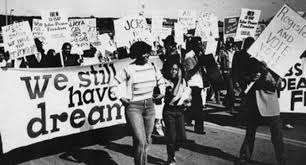One of my passions—obsessions, perhaps—is learning the history, especially African-American and colonial, I wasn’t taught in school.
I got to thinking about that when I realized that next month is African American history month—and the sixtieth anniversary of at least two important parts of that history are coming up.
One of them is the marches from Selma to Montgomery, Alabama. The other is the assassination of Malcolm X.
About Malcolm: He was completely misrepresented, if he was mentioned at all. I first realized as much when I read his autobiography. (That, I believe, motivated me to learn as much as I can about the history I wasn’t taught.) It seems that educators—and the culture generally—has misunderstood and misused “by any means necessary” to paint Malcolm as a maniac with homicide in his heart. He was changing even as he told his story to Alex Haley, his collaborator on his autobiography and, I believe, would have repudiated some of the things he said then—let alone in his earlier speeches—had he lived longer. But even the portrait that emerged from his autobiography and his speeches made him heroic to me because one of his underlying messages was that people have to free themselves from whatever enslaves them, whether it’s an exploitative system, an addictive substance or William Blake’s “mind forg’d manacles.”
Speaking of enslavement: The March from Selma to Montgomery occurred just a few weeks before the 100th anniversary of the American Civil War’s end. (Anyone who tells you that the war wasn’t about slavery is ignorant or dishonest.) But a century later, Blacks—and poor Whites—weren’t free of their shackles. Moreover, they were paying a tax, if you will, on those restraints they bore. But they we’re fighting—and often paying with blood and flesh—to fight them, and their imposers, off. That is about as far from the picture of the Civil Rights movement textbooks and the media painted for us: a sunny diorama of Martin intoning “I have a dream” and well-intentioned people chanting “We shall overcome,” all of it sepia-tinged to make White liberals of the time look heroic and those of today feel good about themselves for admiring them.
All right, I’ll get off my soapbox. (Standing on it while wearing cleats is precarious!) There will be a number of commemorations, including a marches. And, the other day, a bike ride followed the route.




